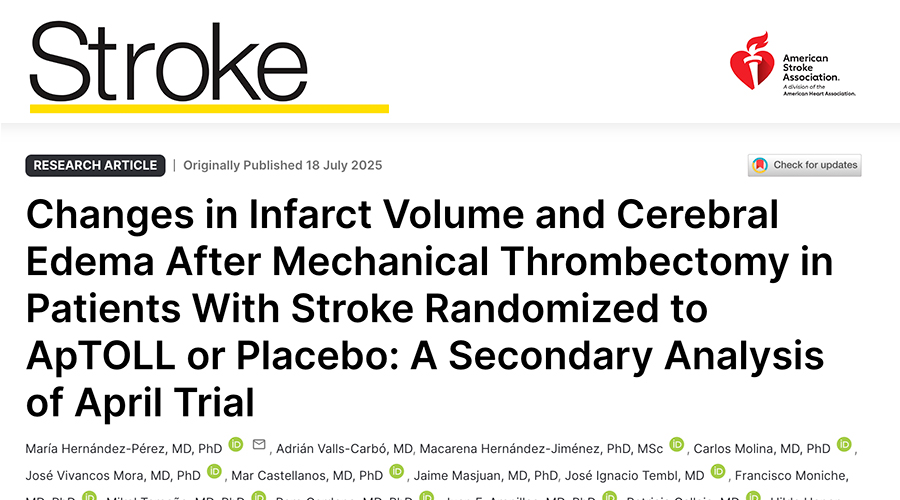31 July, 2025

Scientific journal Stroke, from the American Heart Association (AHA)/American Stroke Association (ASA), published the article Changes in Infarct Volume and Cerebral Edema After Mechanical Thrombectomy in Patients With Stroke Randomized to ApTOLL or Placebo: A Secondary Analysis of April Trial with relevant results from a secondary analysis of the aptaTargets phase 1b/2a trial APRIL in 136 patients with acute ischemic stroke (AIS), which combined cerebroprotector ApTOLL and mechanical thrombectomy.
The research, led by Dr. María Hernández at Germans Trias i Pujol University Hospital and conducted by an international team of experts in neurology, aimed to analyze the effects of the type of treatment in the first hours after a stroke and in long term recovery. Dr. Macarena Hernández-Jiménez, CSO at aptaTargets, and Dr. Marc Ribó, CMO at aptaTargets, co-authored the paper.
The study shows that administering one 0.2 mg/kg dose of ApTOLL in combination with mechanical thrombectomy in patients with AIS in the 6 hours after onset of symptoms significantly reduced the final infarct volume, growth and cerebral edema after 72 hours.
Another important conclusion is that patients with a larger core when admitted, fast progressors and those reaching incomplete reperfusion benefited more from ApTOLL 0.2 mg/kg. ApTOLL seemed to be more effective under conditions prone to infarct growth.
ApTOLL is a first-in-class cerebroprotective drug that acts on the Toll-like receptor 4 (TLR4) with high specificity, blocking the inflammatory response that occurs after an ischemic stroke. The drug was recently transferred to Merck.
This data is complementary and bolsters the main results of the APRIL trail published in JAMA Neurology and presented at the 2023 International Stroke Conference.
Reference article:
Hernández-Pérez M, Valls-Carbó A, Hernández-Jiménez M, Molina C, Vivancos Mora J, Castellanos M, Masjuan J, Tembl J, Moniche F, Terceño M, Cardona P, Arenillas J, Calleja P, Henon H, Calviere L, Mazighi M, Olivot J, Liebeskind J, Ribo M. Stroke (2025). DOI: https://doi.org/10.1161/STROKEAHA.124.04891
